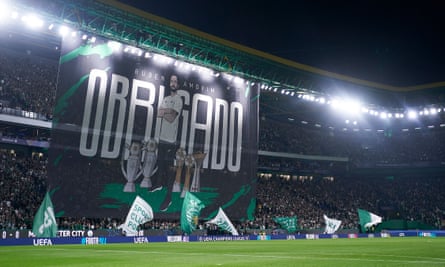The road from the Portuguese third tier to Portman Road is a unique journey and one that will take Rúben Amorim from relative obscurity to one of the most-scrutinised coaching roles in the world. Amorim felt forced to quit his first coaching job at Casa Pia after being sanctioned for not possessing the necessary coaching qualifications less than six years ago, but has rapidly risen to become one of the most sought-after coaches in Europe.
The Estádio Pina Manique is on the outskirts of Lisbon, Amorim’s home town and where he has spent most of his playing and managerial career. The venue holds about 2,500 spectators, a long way from the 30,000 or so expected to be in attendance for Amorim’s first match as Manchester United manager at Ipswich on Sunday.
Amorim’s spell at Casa Pia lasted six months, and was curtailed when he and the club were punished after he gave instructions from the sidelines despite lacking the relevant qualifications. He was there for a short time, but had a huge effect on those who worked with him.
“When he said in front of the group he was leaving, I saw 10, 12 teammates crying,” says the former Casa Pisa forward José Embaló. “I went to shake his hand and hug him, and he said: ‘I’m so sorry but keep working. You never know what life is waiting for you.’”
It was the first job where Amorim implemented the 3-4-3 formation that has been the foundation for his success ever since. The foundations of his staff also began there, with the youthful Adélio Cândido and Carlos Fernandes starting their careers alongside him at Casa Pisa.
“Adélio [Cândido] and Carlos Fernandes, they were very loyal to him,” says Embaló. “They have so much talent to be a top coach. I was 25, while Adélio and Carlos Fernandes were 22, 23. But their minds were so big on football that I learned a lot from them. I really appreciate the way they see football – they showed me age doesn’t matter.”
Amorim’s 13-year playing career had ended two years earlier and he spent the intervening period preparing for how he would approach coaching, including his man-management style. At 33, he was dealing with some players who were older than him and many that were not much younger, but none who had reached the heights he did as a midfielder at Benfica.
“He’s part of the family, he treats you with all the respect,” Embaló says. “At that time, to see him as an older brother who knows a lot of football and the love you see in his eyes, the love he has for football.

“He benched me for a game, so inside I would get so angry. But I didn’t show him. He called me to one side, and he said: ‘Look, José, I know your feelings, but that doesn’t matter. Don’t worry about that, I really need you in this game, but coming from the bench.’ That was a change. I started to appreciate him more. He made me feel that when I was on the bench, I was more important than who was starting.”
Embaló has played in 10 countries, but Amorim left a lasting impression on him. “As a player, when you see the person first and then you see a coach. You just appreciate the time you have together and enjoy,” says the 31-year-old. “I used to go to training and after I didn’t know what to do, I just wanted to go home, rest and wait for the next day to go training because it was so enjoyable.”
At Casa Pia, Amorim came up against Pedro Russiano, an old friend from his Benfica academy days. The duo were teammates throughout the age groups when Amorim got his first taste of elite coaching under the guidance of José Mourinho’s former assistant, José Morais.
after newsletter promotion
“Sometimes he [Morais] put Rúben right-back or central defender or midfielder, defensive midfielder or No 8 or No 10, and he always knew how to play in this position,” Russiano says. “He knew how to play every position and I think it helped him become a smart coach because he was always an intelligent player on the pitch and it’s very important for our intelligence as coaches.”
When Russiano’s Amora met Casa Pia, the latter succumbed to a 1-0 defeat. “The secret to winning 1-0 was to put pressure on the three defenders because he [Amorim] didn’t have Viktor Gyökeres back then,” Russiano says. “It was the same system, the same dynamics as Sporting. The difference is the depth. He creates more depth with Gyökeres. The evolution of his tactics and teams is this player. He has always had the same tactic, but the players have got better.”
It was a springboard that took Amorim to Braga B then the first team, creating an upward trajectory that lasted throughout his time with Sporting and which will now be tested at United. Amorim has evolved as a coach, tweaking the system he first used at Casa Pia, and he continues to innovate.
“I don’t know if he will be a success in Manchester, but he arrives at United with them down, like it was when he moved to Sporting,” says Russiano. “This is a special thing why Ruben takes Manchester United. He’s ready for this.”
Source: theguardian.com


















